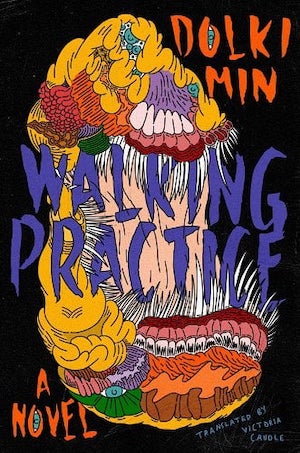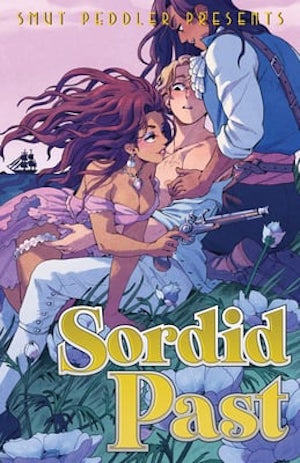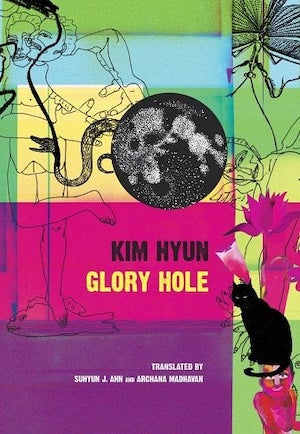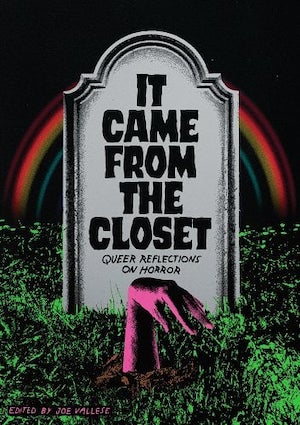Welcome to the gayest of months, accompanied by the brightest sunlight and the shortest inseams. What—or, who—are we reading?
Seriously, though.
Given the general vibes (rancid!) and energy levels (unpredictable!) among my fellow queer, trans, and gnc folks in 2023… I thought our Queering SFF: Pride Month special this time around should focus on recommendations for your reading and watching pleasure. When faced with constant real-life horrors, immersing myself in queer art—books, movies, TV shows, games, and more—is one of the things that keeps my spirit glued together. The other is community. Whether those communities are big or small, transnational or within your own neighborhood, there’s something powerful in knowing you’re not alone. Art does that, too.
Over the next few weeks, we’re going to explore lots of recent queer media I adored but that otherwise flew under the radar. Give some awesome stuff a lil’ boost! Supporting queer art and artists directly has always been important, but with how things are going right now, it’s more necessary than ever.
So, let’s get started with four weird and sexy books to kick off summer reading! I plucked one juicy treat for each genre from the “books I loved” list over the last year, so ideally, there should be something for everyone. (PS, this is totally an excuse to shout about stuff I either didn’t get a chance to review on release or stumbled over later. Be the Bigolas Dickolas Wolfwood you want to see in the world.)
Novel: Walking Practice, written by Dolki Min and translated by Victoria Caudle

“You. You, dear reader, must be curious about my gender. Perhaps you are even feeling a little anxious. Or you might have scraped together clues from what I’ve said and how I’ve said it, constructing my gender to your own design. Regardless as to whether you are right or wrong, you will have come to your own conclusions. […] I also get the impression that it is only after a gender has been assigned that you are seen as human,” the shapeshifting alien protagonist says in the opening chapter of Walking Practice. After crash-landing on earth fifteen years prior and discovering the planet’s gravity to be disabling, they’ve learned through trial and error that the best method for survival… is eating humans. Ideally, eating humans post-fuck like a praying mantis, biting heads off and all. However, the frustrated loneliness of having what is perceived to be a “monstrous” body—a queer, disabled body—gnaws away at them, as does the potential for violence or violation that lurks around every corner.
The agonies of contorting to match the desires of humans on dating apps, including the titular “walking practice” perfecting the gendered ways women and men are supposed to move their bodies, is paired with constant surveillance: the knowledge that everyone is watching and waiting for you to get it wrong. Disability—and having a body that constantly hurts—are another thematic through-line. As the narrator struggles up the subway stairs, being gawked at for the ways gravity compresses their joints, they think, “My body is a filthy jerk that is constantly keeping its eyes peeled for any chance to betray me.” When they fall down after boarding the bus, and no one helps: “They must have been thinking, if only you were just a little less repulsive, I would step forward and lend a hand.” Questions like how many stairs will I encounter on this walk? what if the elevator in my hook-up’s apartment building is down? constantly shape their lived experience of an inaccessible and inconsiderate world.
Walking Practice is hands-down the best book I’ve read this year—and that’s without even getting into the final chapters, here, though they rang my brain like a bell. As translator Victoria Caudill writes in their ending note, “Translating this novel at a time when queer activists in Korea are fighting for an anti-discrimination bill and when the rights of queer Americans are under sustained attack reinforces my goal as a translator to make queer narratives visible and visceral.” Overall, their translation is phenomenal. I specifically love how they capture the physicality and “disrupted legibility” of Dolki Min’s original Korean prose by playing with the English typesetting. It’s a clever visual effect that fits well alongside his gorgeous, unsettling interior illustrations (there is one, for example, where the organic shifting flesh on the page resembles both intestines and, at its endpoints, the hooded heads of uncut cocks).
Truly, I can’t recommend this book enough.
Comic: Sordid Past, edited by Andrea Purcell

Mainstream publishing in the USA, comics included, still carries a certain amount of pearl-clutching squeamishness when it comes to erotica—doubly so when it’s queer. Blame the Comics Code Authority and its sustained cultural tendrils, for one. So whenever I happen upon a small press that produces handsome, inclusive, full-color books of adult queer comics… you know I’m going to buy them! The anthology Sordid Past gathers stories about “the smuttier side of antiquity,” featuring thirteen comics of “sex positive, consent driven” horny historical/fantastical encounters. Whether set at a closed-for-the-night video game arcade in the ’80s, a ritual orgy in BCE Mesopotamia, a townhouse in Victorian London, or elsewhere-elsewhen, these romps span many different art styles, storylines, and ideas about what’s sexy.
I appreciated that the collection contains such a wide range of bodies, and combinations of bodies. Cis, trans, and gender-nonconforming bodies; skinny and fat and short and tall bodies; bodies across several races and ethnicities; young bodies and later-middle-aged bodies: they’re all getting it on together. While naturally not every comic will be to every reader’s personal taste, it was fun (and sometimes outright funny!) even to read the pieces that weren’t on my individual wavelength. One of the consistent things across the comics in Sordid Past is their sense of humor, after all. While a few pieces lean serious, like Lindsay McSeveney’s “Pickup Artist,” many contributors approach these historical erotic shorts as if they should be silly and playful, in the way sex itself can be silly and playful. They’re not shy about characters laughing with each other… and they’re also not shy about characters exploring one another’s bodies, hangups, and desires.
Recommended for a light, entertaining read—best paired with a warm breeze and a cold beer.
Poetry: Glory Hole, written by Kim Hyun and translated by Suhyun J. Ahn and Archana Madhavan

I’m a steady reader of poetry—though it’s a genre I don’t write about much! Devouring the astounding things poets do with language is, mostly, a personal pleasure. But sometimes I encounter a book of poetry that startles and challenges me so much I’ve absolutely got to talk about it… and Kim Hyun’s Glory Hole is one of those. The defiant, strange, dystopian, erotic, and ultimately confounding selection of fifty-one poems within leaps through time and space, mashing together language and imagery ranging from science fiction novels to plain-ol’ gay porn. There are references to Marilyn Monroe and Gregg Araki’s Mysterious Skin, William Burroughs and Phillip K. Dick and UFOs, alongside footnotes-upon-footnotes alluding to other texts—both real and invented. (The translators, by the way, have done an amazing job rendering these layers of textuality across languages.)
To be frank, it’s super rare that I feel pressed to flip straight to the ending commentary because I’ve gotten delightfully, frightfully lost inside a text. But I needed to do that, here! The kaleidoscopic, overwhelming experience of Glory Hole had me reeling. Luckily, Park Sang Soo’s essay “The Real Queer Sci-fi-Metafiction Theater: A Handbook to Glory Hole” helps. Park calls the reader out with fond amusement, saying, “I wish I could see your face right now. […] I imagine some of you rushed to the commentary because you were seeking an answer [on how to read these poems].” And yeah, I sure did. As the essay suggests, these poems contain an intense layering of subtext and text and more subtext all “built upon an extraordinarily gay sensibility.” To read Glory Hole, either one poem at a time or in a furious sprint, you have to give up on knowing every last thing about the speaker, the poem, the writer… and instead, simply immerse. Let the weird, weird waves crash over you.
Many, if not most, of the poems in Glory Hole are uncomfortable—sometimes genuinely upsetting. I’m not sure if I’m recommending the book, so much as I am holding it out to you and saying, “well, shit, I won’t be forgetting that any time soon.”
Essays: It Came from the Closet: Queer Reflections on Horror, edited by Joe Vallese

I’d been eagerly awaiting this essay collection from the second it was announced—and who amongst us wouldn’t fall for the vibrantly pink, limp-wristed zombie hand on the cover? It Came from the Closet gathers together a whopping twenty-five essays on horror and queerness with interior illustrations from beloved trans comics artist Bishakh Som. Organized into themed sections, from “Part 1: An Excellent Day for an Exorcism” to “Part V: Final Cuts,” Joe Vallese has crafted a wide-ranging overview of how contemporary queer writers relate to the big, spooky world of horror films. Essayists include Carmen Maria Machado (“Both Ways,” on Jennifer’s Body as a messy bisexual horror story), Addie Tsai (“Twin/Skin,” on Dead Ringers and complicated sibling relationships), Samuel Autman (“Black Body Snatchers,” on Get Out and Black queer experience), and many more.
What I found most striking about the pieces in this collection was how often they don’t agree with each other about the relationships between queerness, horror, and film/fiction. When it comes to body horror, for example, disability hits differently for each essayist who tackles the topic. Other contributors reflect on the myriad ways race does (or, doesn’t!) appear in horror movies. The end result is an essay collection that feels as alive as the genre itself—and as alive as the debates writers always get up to whenever you toss them a bone to chew on together. The length of the essays also made this an eminently readable collection: they’re tightly constructed, and not very long. Even when we tread onto scholarly approaches—thumbs up for the explanation of Sedgwick’s “reparative reading” in one of the first essays!—the essays remain succinct.
As for me, the essays that stuck out the most include those listed above… but also Grant Sutton’s “Blood, Actually,” on Friday the 13th Part II. Sutton explores the fears and dangers of being a visibly queer man in a rural, Southern space through the lens of the slasher flick, which gave me the warm-bath sensation of intimate recognition. These are the stories that still need telling; these are the lives many of us still lead, and horror movies offer one lens through which to understand them. Maybe read this one curled up safe with all the house lights turned on, one morsel at a time.
***
I hope one, or all, of these four books—whether fiction, nonfiction, comics, or poetry—gets your Pride Month reading adventures started on the right track!
Next week, we’re talking TV.
Lee Mandelo (he/they) is a writer, critic, and occasional editor whose fields of interest include speculative and queer fiction–especially where the two coincide. Summer Sons, their spooky gay debut novel, was recently published by Tordotcom, with other stories featuring in magazines like Uncanny and Nightmare. Aside from a brief stint overseas, Lee has spent their life ranging across Kentucky, currently living in Lexington and pursuing a PhD in Gender Studies at the University of Kentucky.










